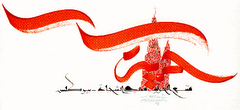Media ignores eight Palestinian hunger strikers as they near death

Palestinians in Gaza protesting Israeli prisons at the Red Cross office on April 23, 2012. (Photo: Mohammed Abed/AFP)
Palestinians are railing against Israeli administrative detention, imprisonment without charge, with over 2,000 prisoners currently on hunger strike, two of which are in critical condition, now in their 59th day of strike. Yet the new wave of protests that began on April 17, 2012, Palestinian Prisoners' Day, are receiving little media attention.Both Khader Adnan and Hana Shalabi, who were released earlier this month, received attention from major sources including Al Jazeera English, the BBC, Russia Today, and the New York Times. However, there a relative silence on the protests Bilal Diab and Thaer Halahla who started refusing food on February 29, 2012. Neither the BBC nor the New York Times have touched them. And Al Jazeera English ran only one article. They were briefly mentioned in an April 17, 2012 report on Palestinian Prisoner's Day:
Two of them, Bilal Diab, 27, and Thaer Halahla, 34, have been refusing food for 50 days, with medics expressing concern over their deteriorating health.Their "deteriorating health" includes slipping in an out of comas and vomiting blood; they are teetering near death. On Monday in light of their condition, their attorney petitioned an Israeli military court to release them. But the judge rejected the appeal citing, the two are "responsible for their own state of health," said Jamil al-Khatib to AFP, attorney for both prisoners. "Yesterday the judge held a closed meeting with the Shin Bet (internal security service) and the military advocate general, and he examined their appeals," said al-Khatib, continuing, "He looked at the confidential files and decided that their hunger strike was their choice and does not affect the danger which they pose."
Diab and Halahleh are part of a group of eight prisoners on extended hunger strikes. From the group, seven have already been transferred to Ramleh prison medical clinic. The prisoner advocacy group Addameer is following their cases and wrote on April 25, 2012:
Thaer Halahleh and Bilal Diab are on their 57th day of hunger strike today. Despite their rapidly deteriorating medical condition, both of their appeals against their administrative detention orders were rejected by an Israeli military judge on 23 April. Yesterday, 24 April, Hassan Safadi’s petition to the Israeli High Court against his administrative detention was rejected. He is on his 52nd day of hunger strike. Administrative detainees Omar Abu Shalal and Jaafar Azzedine are on their 50th and 35th days of hunger strike respectively. Also now in Ramleh prison medical center are Mohammad Taj, on his 39th day of hunger strike demanding to be treated as a prison of war, and Mahmoud Sarsak, on his 34th day of hunger strike in protest of being held under Israel's Unlawful Combatants Law. Lastly, Abdullah Barghouti, held in isolation in Rimon prison, is on his 14th day of hunger strike. Addameer reiterates its grave concern that these hunger strikers are not receiving adequate healthcare in the IPS[Israeli Prison Service] medical center and that independent doctors are still being denied visits to them. [Emphasis added]One explanation for the media blackout is that Israeli authorities are denying prisoner rights groups from visiting the hunger strikers. Both Adnan and Shalabi received visits from Addameer and were attended by physicians from Doctors without Borders (Médecins Sans Frontières-MSF), which allowed for a flow of updates to the press. But for the eight long-term strikers and eight prisoners confined to a detention medical clinic, and the additional 2,000 prisoners on strike since Prisoners' Day, of which hundreds have incurred raids and solitary confinement as a punitive counter to their dissent, both groups are forbidden to visit them.
Yet, despite the lack of media attention, the Israeli authorities are paying close attention to the strikers, cracking down on their protest. 19 prisoners are currently being held in solitary confinement, with one prisoner Ahmad Sa'adat, starting his strike while serving three years in isolation—during which time he has yet to be charged with a crime. In addition to solidarity confinement, Addameer says the Israeli prison authorities are practicing "widespread punishment." These measures include daily raids by a "special forces" unit trained in combat, transfers, and even fines:
In Ashkelon prison, the 150 hunger strikers are experiencing daily raids and attacks on their rooms by Israeli special forces. In addition to all personal belongings being confiscated, the IPS also confiscated the hunger-striking prisoners’ only nourishment: salt for their water. Hunger striking prisoners in Nafha prison have also had their salt confiscated, raising serious health concerns for the prisoners engaged in hunger strike. Of the approximately 400 prisoners on hunger strike in Nafha, at least 40 were transferred out of their sections. Hunger strikers in Nafha have also been subjected to fines and electricity was cut in their rooms.But Palestinian prisoners are determined to continue their protest against mass incarceration without charge. While Adnan and Shalabi's strikes sparked an international conversation calling into question Israel's practice of administrative detention—which is illegal under international law—Diab and Halahleh are not languishing in prison without support. Over the weekend 120 Palestinians in Ofer prison will join the strike and on May 1st, six females prisoners in Hasharon will also start an open hunger strike.






Aucun commentaire:
Enregistrer un commentaire